Feb 28, 2018


[Common Grounds in the Baylands] [Public Outreach at SF Bay Flyway Festival on Mare Island]
Team Common Ground, a group of designers, engineers, scientists, and educators is working on a design study of the San Pablo Baylands and highway 37 corridor for the Resilient by Design|Bay Area Challenge.While the focus of the design challenge is on strengthening local and regional resilience to sea level rise, severe storms, flooding, and seismic events, the team is also trying to address other, sometimes more pressing challenges including lack of housing, displacement, limited access to public land, and outdated transportation.
Along with local stakeholders and the input of San Pablo Bay communities, Team Common Ground is looking at ways that people around San Pablo Bay could share and steward environmental resources while having more diverse means to connect with each other for work, living, recreation, food and health, and cultural ties.
This focus on San Pablo Bay has made understanding the work-to-date on State Route 37 (SR 37) and baylands conservation important aspects of the team’s approach. The project aims to reimagine the SR 37 corridor, support ongoing restoration of the Bay Area’s largest continuous marsh system, and equitably connect communities around San Pablo Bay through a resilient and diverse transportation network. To unite the communities of San Pablo Bay with the rest of the Bay Area, Team Common Ground envisions transitioning from predominantly single-function transportation infrastructure to a network of interrelated modes that encourage smart growth, are resilient to sea-level rise and seismic events, and that accommodate natural hydrological dynamics to incrementally restore vibrant and functional bayland ecosystems.
TLS Landscape Architecture Principal Erik Prince described the team’s scope, “We see our role as supporting and building on the work that’s already underway, communicating the risks of sea level rise, helping to provide an appealing vision of what the future of the SR37 corridor and baylands might look like, and working with community leaders to get broad-based stakeholder buy-in. We want our proposal to be realistic, but we also want to provide a fresh look at the problem while still drawing from and supporting the years of hard work that’s already been done.”
Team Common Ground consists of: TLS Landscape Architecture, Exploratorium, Sitelab Urban Studio, Michael Maltzan Architecture, Guy Nordenson & Associates, Rana Creek Design, Lotus Water, Richard Hindle, Dr. John Oliver, HR&A Advisors, Fehr & Peers Transportation Consultants.
Feb 26, 2018
by: Elena Karoulina, Executive Director
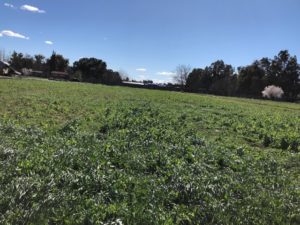
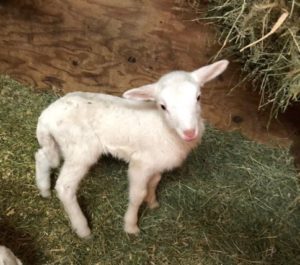
A couple weeks ago I had a great visit with Denise and Ben Lyons at their Lockewood Acres Farm in Vacaville. As a part of our work on the Solano Local Food System, I am getting to know local small farmers who are doing things right: they take care of the soil on their farms, plant diversified crop, pay special attention to the health of their water, strive for low-input farming (producing most of the fertility on the farm), and as a rule, look to work with nature, not against it, in harmonious, healing relationships with land, all living things and their communities.
Denise and Ben Lyons are this type of sustainable farmers. Their 10-acre beautiful, certified organic farm is located in the agricultural area between Vacaville and Dixon. When I came on a breezy & chilly February morning, both farmers were outside: Ben was fixing things around the barn, and Denise was wrapping up a meeting with Solano farmbudsman, Sarah Hawkins, going over rules and regulations governing various aspects of the farms’ operation. Even a small farm is a serious business, with its hard labor in the fields, barns and orchard, and different, but equally demanding work behind the scene: marketing, accounting, legal compliance, reporting… The work is endless and most of it is unseen by the community that gets to enjoy the fruits of this hard labor.
Most of the fields were resting for winter, covered by a green blanket of cover crop – fava beans, peas and other nitrogen-fixers. Before these plants go to seed, Ben will work this green manure into the fields, enriching and nurturing the soil, increasing its organic matter and improving water retention. This healthy soil will then feed the plants growing there that will eventually find their way to our kitchens and tables: tomatoes, cucumbers, eggplants, peppers, watermelons, salad greens, squashes, culinary herbs, and all sorts of root vegetables.
Fruit trees in the nearby orchard were also resting, waiting for the time when the sap will begin to flow, followed by beautiful fragrant flowers and then fruits. Apples, pears, all sorts of citrus, persimmons, plums, cherries, pomegranates, and figs – the list goes on and on of the bounty produced in this well-designed orchard. Olives are pressed in small batches in a local olive press – you can buy this olive oil directly from the farm.
Countless chickens were roaming the orchard, scratching the soil and adding natural fertilizers everywhere they went. Careful selection of heritage breeds provides for nutritious eggs in all possible colors: dark brown, light brown, blue, green, white.
In the small barns, there were dairy goats and hard-working sheep that regularly provide grass mowing services in the orchard, surrounded by adorable little ones constantly looking for milk and warmth. Keeping animals on the farm ensures a reliable source of manure, the traditional foundation of soil fertility, that decreases the demand for the outside input and supports this vibrant ecosystem called “Lockewood Acres Farm”.
An apiary completes the picture of the farm. Raw, delicious honey is available for sale year around.
Denise and Ben’ journey to this farm started with a discovery of the benefits of earthworms. Their original vision was to develop a homestead to nourish the immediate family. The vision eventually grew to include feeding the community! After the initial skepticism (mostly from Ben), the couple turned to organic farming, which Ben now describes as a “common-sense approach to farming”.
Would you like to join the community of the Lockewood Acres Farm well-nourished customers? This is what the Community Supported Agriculture stands for! Sign up to become a member of this farm’s CSA program. For more details, click here. If you are at the Vacaville Farmers Market on Saturdays, stop by the Lockewood Acres Farm stand and please say hi from their friends at Sustainable Solano!
There are multiple ways to participate and the farmers are flexible to work with you and your budget to provide nutrient dense, wholesome food for you and your family!
Nov 1, 2017

Solano County middle and high school students and their teachers are being asked to “Imagine a Day Without Water”- this year’s theme for the 2018 Water Awareness Video Contest, sponsored by the Solano County Water Agency and local water utilities. Participating students and teachers will have the chance to win up to $1,500 in cash by creating an original 60-second Public Service Announcement video on a variety of water efficiency topics, highlighting actions that can be taken each day to use water more wisely.
Solano County teachers who sponsor multiple students will receive an additional incentive of Amazon gift cards.
The contest is open to middle school and high school students in Solano County. Submissions will judged on entertainment value, originality, videography, style and organization, audio/sound, movie content and accuracy. The deadline to enter is Wednesday, April 11, 2018.
For contest rules and entry forms and tips on using water efficiently, visit the video contest page at www.solanosaveswater.org
Nov 1, 2017
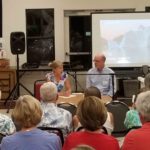
By Stephanie Oeslgigie Jordan, Project Manager, Chef
Can a community decide how it will access food for its members? Is there democratic participation in our food system? What mindsets frame the future of our local food systems? These questions and more kicked off a fascinating lecture-discussion led by Dr. Gail Feenstra and Dr. David Campbell of UC Davis on October 25. Coordinated by Sustainable Solano, the talk was part of an ongoing program hosted by Heritage Presbyterian Church in Benicia, titled “How to Make the World a Better Place,” which features presentations and learning opportunities for people of all ages in Benicia.
Structured as an interview akin to Terry Gross’ “Fresh Air” program on NPR, Drs. Feenstra and Campbell asked provocative questions to each other, to get at the heart of issues surrounding local food systems. The idea of “Local Food” has grown exponentially in the last couple of decades. Dr. Campbell pointed out that in 1997, he and his research team could find only 100 articles on local food, and in 2011 there were over 2000 articles! (In fact, the USDA LFPP grant that Sustainable Solano was awarded didn’t exist 10 years ago.) So, what is all the fuss about? Communities are becoming increasingly interested in how food will be produced, distributed and sold. Over the years, competitive grants programs began to pop up (i.e. Placer Grown, Solano Grown) along with other programs that help communities start businesses and projects that assist local farmers/growers.
When running a food project, Dr. Feenstra had 3 important tips for success (she called them the “3 Ps”): 1) Partnerships are key, and the more diverse your partnerships, the better; 2) Public Participation is necessary for a solid community base and the development of leaders; and 3) maintaining high Principles & Values will help projects achieve social and environmental justice.
Sounds easy, right? Well….there are some challenges according to Dr. Campbell, when asked about planning future food systems. There are 3 different frames of mind out there, each with a different focus. The first is driven by the question, “How are we going to feed 9 billion people?” This perspective is driven by the idea that we need “more”, and incorporates the latest farming technology to increase volume and production. The second group has an environmental focus, driven by climate change. A local example includes the fact that crops are changing location in California, due to increased heat, drought, and changing weather patterns. (We might add that sustainable vs. unsustainable farming methods would affect this problem as well.) The third group is focused on social justice, asking “Why doesn’t everyone have access to healthy food?” and “Who is really running the elements of our food system?”
Not surprisingly, the solution lies in the need for these 3 frames to work together, instead of compete for attention. But how? Dr. Campbell suggests that local communities have advantages of doing work that integrates these elements. Referencing Daniel Kemmis’ book, Community and the Politics of Place, Dr. Campbell theorizes that it is this common love of place that can serve as a foundation to bring people together and allow communities to better tackle issues and develop their own systems. At the same time, communities must have peripheral vision – they must learn to see what’s around them, and develop diverse partnerships with people who can contribute their own unique experiences. If you are too local, you will fight the symptoms, but not the root cause.
And remember those 2000 articles that now exist on local food systems? All that research has illuminated three challenges, which communities must keep in mind: 1) Economic challenges which dance between paying the farmer enough money (so that he/she can continue farming), yet making food affordable for everyone, 2) Social challenges, addressed by numerous studies showing how middle- and upper-class white people are the only ones who can afford healthy food, and 3) Political challenges which highlight the lack of cooperation between one side of the food movement which wants to make changes within, and the other side which wants to “blow up” the system and start something entirely new.
In spite of all these challenges, Dr. Campbell subscribes to what he calls “hopeful realism.” The talk finished with a video of a UC Davis urban agriculture project, where youth work at a community garden in Oakland. Instead of having the director of the program lead a tour through the garden, UC Davis asked the youth to talk about their experiences and knowledge while the camera rolled. At the end of the video, teens and youth were using words such as “love” and “happy” to describe how they felt about their work in the garden. When diverse groups of participants come together and cooperate to solve issues, everyone has the opportunity to benefit in some way.
About the speakers:
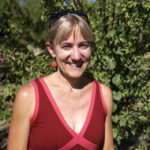 Gail Feenstra is the Deputy Director of the Sustainable Agriculture Research and Education Program (SAREP), a program of the Agricultural Sustainability Institute at UC Davis and the UC Division of Agriculture and Natural Resources (ANR). For Dr. Feenstra’s full biography, click here.
Gail Feenstra is the Deputy Director of the Sustainable Agriculture Research and Education Program (SAREP), a program of the Agricultural Sustainability Institute at UC Davis and the UC Division of Agriculture and Natural Resources (ANR). For Dr. Feenstra’s full biography, click here.
http://asi.ucdavis.edu/people/Feenstra
 David Campbell, a political scientist, is Associate Dean for social/human sciences in the College of Agricultural and Environmental Sciences at UC Davis. He was appointed Associate Dean in October 2014. For Dr. Campbell’s full biography, click here.
David Campbell, a political scientist, is Associate Dean for social/human sciences in the College of Agricultural and Environmental Sciences at UC Davis. He was appointed Associate Dean in October 2014. For Dr. Campbell’s full biography, click here.
http://www.caes.ucdavis.edu/about/directory/fsd/david-campbell
Oct 4, 2017
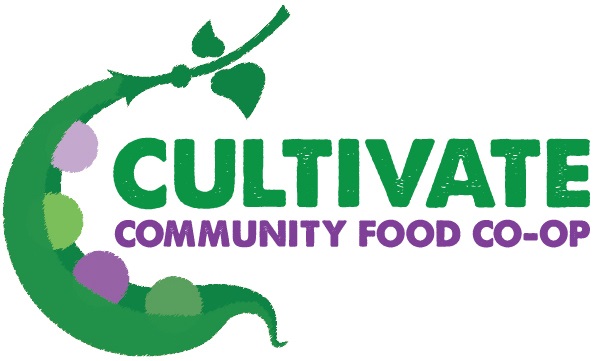
By Cultivate Community Food Cooperative
The experts say it will take a startup food co-op about 3-5 yrs. to open a food co-op grocery store. Well if that is true, then Cultivate Community Food Co-op is right on course. After 18 months of Stage I development – Organizing, CCFC reached Stage II development – Feasibility and Planning, in July, when we filed our Articles of Incorporation.
In September we had an Incorporation party and sold 25 owner shares, (soon we will be selling owner shares online.) Which brings us to October, which just happens to be ‘Co-op month’. Co-op month has been celebrated annually in October across the United States for more than half a century. It is a time for cooperative businesses to reflect on their shared principles and to educate others about the value of belonging to a cooperative.
In doing our part, Cultivate Community Food Co-op will be joining Sustainable Solano in a panel discussion entitled, ‘How to Make the World Better’, on Wed. Oct. 25 at the Heritage Presbyterian Church in Benicia. CCFC’s founder, Paula Schnese, will share with the community the progress the food co-op has made, talk about our future goals and timelines, and answer questions from the audience. In addition to this educational event, during Co-op month, CCFC will
also be sharing information at some of the local farmers markets and at the Loma Vista Farm Harvest Festival on October 21st .
Become an owner of your local food co-op! We will be selling owner shares at all the events we attend! ��
Our Collective Goals
To create a sustainable grocery business based on member ownership and democratic decision-making
To support local producers and sustainable agriculture
To provide health-enhancing foods
To keep prices as low as possible
To be fair and supportive to our employees and to be sensitive to the working and living
conditions of those who make what we sell
To be a community resource that helps the people of Benicia and Vallejo lead healthier lives
To be a place in the community where people can come to gather and create community
To be good stewards of the environment through conscientious, sustainable use of resources
To reach out to low-income members of the community and enable their participation.
To welcome all.
Our Mission
Cultivate Community Food Co-op will be Solano County’s first community-owned, natural grocery store. We will be a one stop, brick and mortar grocer dedicated to providing high-quality, locally-sourced, culturally-relevant, ethically-produced and affordable products.
Offering health and wellness education, we aim to empower our community and provide a public meeting space to engage with others. We are committed to creating and maintaining a more sustainable economy with a just and equitable future for our farmers, artisans, employees and owners by decreasing the physical and social distance between producers and consumers.
Cultivate Community Food Cooperative, Inc. (CCFC) is a cooperative corporation organized under the Consumer Cooperative Corporation Law of California
Become an Owner of CCFC: Owners in good standing may vote in co-op elections, attend the Annual Meeting, and run for the Board of Directors.
Other benefits include:
Coupons, Sales and Discount Days
Case Discounts on Special Orders
Patronage Refund
Discounted Classes
Select a Plan: Online sales will be available on our website soon
Full Fair Share*: Invest $300
Strongly encouraged to facilitate store opening
Partial Share*: Invest $25
Now and every quarter (or more often) until the full Fair Share of $300 is reached
*A $5 processing fee is charged (this helps with the cost of creating membership cards)
Contact Us:
E-mail: info@cultivatecommunityfood.coop
Website: http://cultivatecommunityfood.coop/
Facebook Page: https://www.facebook.com/cultivatecommunityfood.coop/
Mailing address: P.O. Box 94, Benicia, CA 94510







 Gail Feenstra is the Deputy Director of the Sustainable Agriculture Research and Education Program (SAREP), a program of the Agricultural Sustainability Institute at UC Davis and the UC Division of Agriculture and Natural Resources (ANR). For Dr. Feenstra’s full biography, click here.
Gail Feenstra is the Deputy Director of the Sustainable Agriculture Research and Education Program (SAREP), a program of the Agricultural Sustainability Institute at UC Davis and the UC Division of Agriculture and Natural Resources (ANR). For Dr. Feenstra’s full biography, click here. David Campbell, a political scientist, is Associate Dean for social/human sciences in the College of Agricultural and Environmental Sciences at UC Davis. He was appointed Associate Dean in October 2014. For Dr. Campbell’s full biography, click here.
David Campbell, a political scientist, is Associate Dean for social/human sciences in the College of Agricultural and Environmental Sciences at UC Davis. He was appointed Associate Dean in October 2014. For Dr. Campbell’s full biography, click here.
